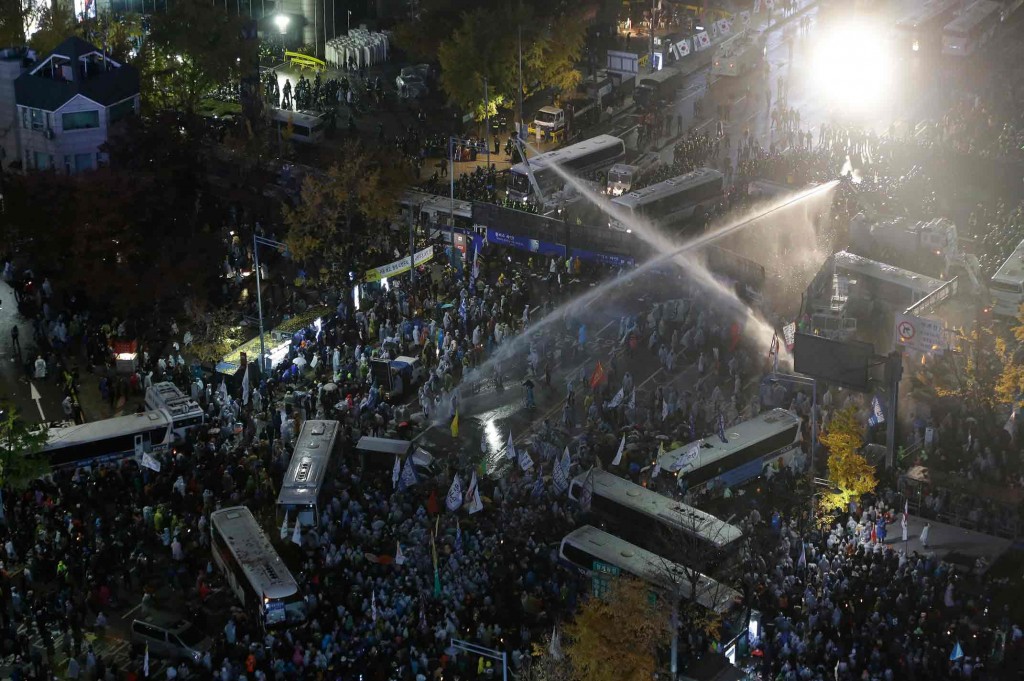- California Assembly OKs highest minimum wage in nation
- S. Korea unveils first graphic cigarette warnings
- US joins with South Korea, Japan in bid to deter North Korea
- LPGA golfer Chun In-gee finally back in action
- S. Korea won’t be top seed in final World Cup qualification round
- US men’s soccer misses 2nd straight Olympics
- US back on track in qualifying with 4-0 win over Guatemala
- High-intensity workout injuries spawn cottage industry
- CDC expands range of Zika mosquitoes into parts of Northeast
- Who knew? ‘The Walking Dead’ is helping families connect
UN rapporteur urges SKorea to stop violent crackdown on protesters

South Korean riot police officers spray water cannons as police officers try to break up protesters trying to march to the Presidential House after a rally against government’s policy in Seoul, South Korea, Saturday, Nov. 14, 2015. Police fired tear gas and water cannons Saturday as they clashed with anti-government demonstrators who marched through Seoul in what was believed to be the largest protest in South Korea’s capital in more than seven years.(AP Photo/Ahn Young-joon)
SEOUL (Yonhap) — South Korea should stop the excessive use of force by police at rallies, the U.N. special rapporteur on the rights to freedom of peaceful assembly and association said Friday.
Sharing the preliminary findings and recommendations at the end of his first official visit to the country, Maina Kiai said the use of water cannons and bus barricades cannot help but raise tensions between the protesters and police, urging local authorities to restrain from using them.
In November, tens of thousands of demonstrators took to the streets in downtown Seoul to protest the government’s decision to adopt state history textbooks for secondary students and push for labor reforms.
The rally turned violent as some protesters brandished metal pipes and police fired water cannons at them. A farmer is still in a critical condition after being knocked down by a water cannon.
“The fact that a few people are violent in an assembly does not make the assembly violent under international law,” he said.
“A fundamental problem is the fact that assemblies are deemed to be ‘unlawful’ unless organizers notify the authorities in advance,” Kiai said in a press conference held in central Seoul, wrapping up his 10-day visit. “However, they (the laws on assembly and demonstration act) are equally clear that organizers’ failure to notify does not make an assembly illegal, except in very limited circumstances.”
The South Korean government should not use public inconvenience and security threats from the North as excuses to restrict the people’s rights, he added.
“I sense a trend of gradual regression on the rights to freedom of peaceful assembly and of association,” he said. “Even the courts which should always interpret laws in favor of rights have recently been moving towards restricting rights rather than expanding them.”
Kiai also expressed concern over the recent revocation of the legal status of a South Korean teachers’ union.
Last week, an appeals court upheld a lower court’s ruling that the Korean Teachers and Education Workers Union (KTU) is not a legitimate labor group because its members include fired teachers.
“International human rights law is clear that the dissolution of a trade union should only occur in extremely serious cases, as a measure of last resort,” he said. “I do not consider that the case of KTU met this high threshold.”
Kiai will present a final report of his visit to the U.N. Human Rights Council in June 2016.











![그룹 방탄소년단(BTS) [BTS 공식 트위터. 재판매 및 DB 금지]](http://www.koreatimesus.com/wp-content/uploads/2025/07/Untitled-5-copy-199x223.jpg)





